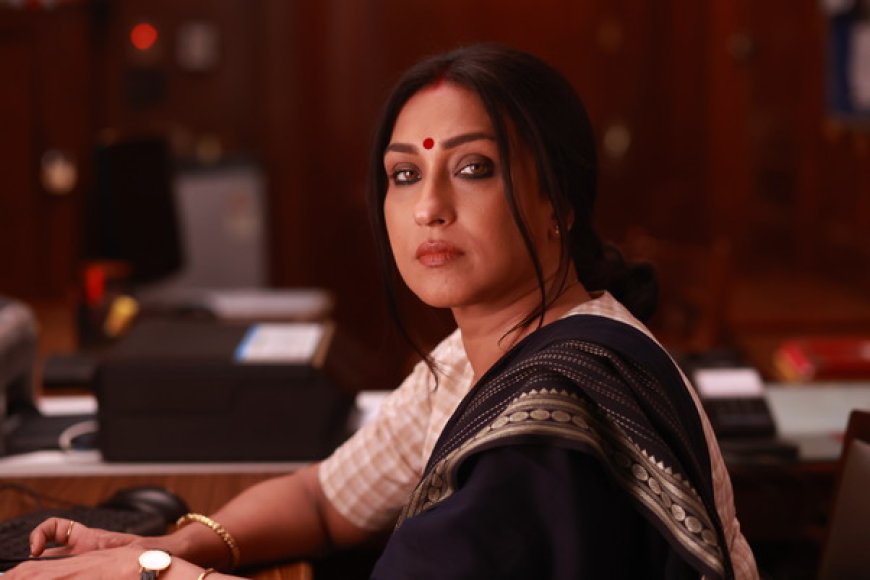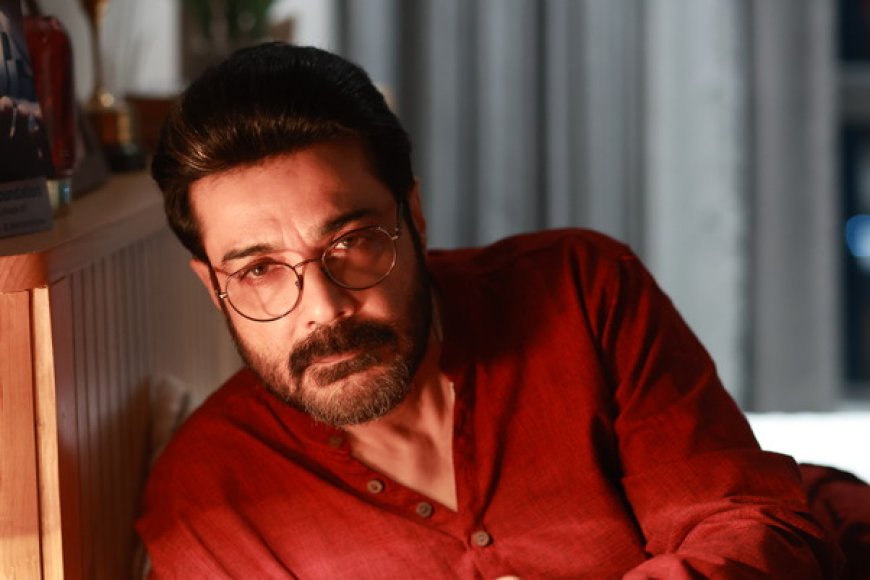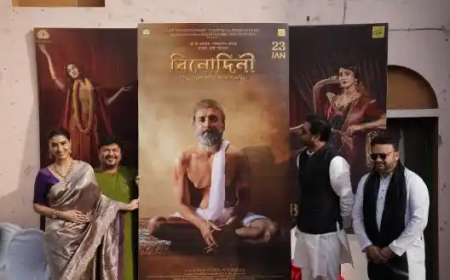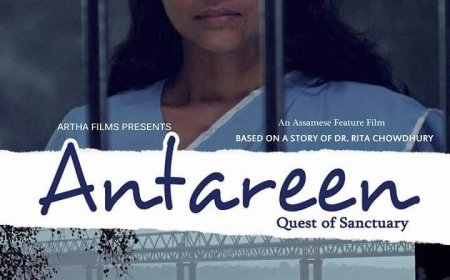Film Review : AJOGGO (THE UNSUITABLE)
Shoma A. Chatterji provides a comprehensive review of the fim Ajoggo
The film begins with a dramatic scene of an aged man struggling to save his life lying on the railway tracks, his hands and feet tied tight so that he cannot free himself. He gets run over by a rushing train. Who is this man? Who has killed him so brutally and why? The answer to this riddle comes up almost towards the end of the film while this scene is repeated as punctuation marks in a strange story.
But is this so important? Yes and no. Yes, because it holds the key about an old love story which ended on a sad note. No, because, there is absolutely no clue about childhood sweethearts growing up to become inseparable lovers. The flashbacks show them as small kids who are always together, but just too little to understand the ramifications of undying love. This is the weakest link in the story because the absence of showing the lovers as adolescent kids graduating to become lovers weakens the story when they meet each other after decades. This was unavoidable because the director simply could not afford to show Rituparna and Prosenjit as teenage lovers and he did not take on to the idea of making them look teenagers. Neither did he take the courageous effort to take younger actors to play their younger versions because the USP was strongly nailed to Prosenjit and Rituparna’s commercial prospects as the hottest commercial pair in the history of Bengali cinema.
When the film opens, Parna is married to Raktim, a young man (Shilajit) and lives with him and their small, polio-afflicted daughter within a financially unstable ambience because Shilajit has lost his job during Covid 19. He is a good husband but is slowly and steadily slipping into alcoholism. During one of these drinking binges, he meets Prosun, apparently a high-powered industrialist giant who drinks with him and almost at once, strike up more than a drinking buddy relationship which is a bit surprising considering their personalities, dressing styles, etc clearly point out the difference in class. But this has solid logic behind it because Prosen’s growing up has been in far from affluent conditions.
During the second of third meeting of these friends, Prosen drives him home and suddenly finds Parna, his old flame, as his drinking buddy’s wife. He makes friends with their little daughter and is more shocked than surprised to meet his old lover after ages. Thankfully, no sparks fly, no bombs explode but both feel sorry just to meet one another which serves as a reminder to their old love affair. They could not marry because the affair was truncated by Parna’s politician father and forced Prosen’s family to leave the small town after Prosen’s communist father is tied up and laid along the railway tracks. The murder remained unsolved and the killer wandered as freely as a free bird. Now you know the secret of that man run over by a rushing train many years ago.
The script probably found it an uphill job to remove the knots and tangles in Prosen and Parna’s tragic past so it took the pair for a holiday in Puri, engineered of course, by Prosen by packing off Parna for a business conference there and also planning a holiday trip for her husband and daughter book in the same hotel in Puri. I forgot to add that right in the beginning, Parna bags a job in a high-powered firm after a long, tear-jerking interview which is bound to send the wrong message to all housewives seeking a job to make both ends meet and brings the film a few rungs down the melodramatic ladder.
Parna’s husband remains completely ignorant about his wife’s past love story and is now a very good friend of Prosen. The narrative shifts to the seaside temple resort of Sri Jagannath at Puri where the script tries on infuse some drama between the estranged lovers Prasen and Parna with the waves of the sea kissing their feet as they exchange the memories and the reason for their split so many years ago. The chant of “Jai Jagannath” happens all too often to fit into the mood of this soft but sad love story and invests the mood with a needless touch of religious beliefs. This does not quite jell with the dialogue between Parna and Prosen where we are let into the secret of what led to the breakup of the lovers so many years ago. Raktim remains completely ignorant of his wife’s love story while Prosen apparently unmarried, lives with his mother who, not knowing the reason for the break-up, bears a strong anger towards Parna which peters out when she learns the truth. Like a fairy tale ending, Raktim is promised a solid job in Kolkata upon their return.
The script delves now and then into the fairy tale of the frog who wanted to marry a princess who fell in love with her and turned out to be a cursed prince who turned back to his prince-reality once he slept with the princess. What relevance this fairy tale has to the Prosen-Parna love story is not clear so the analogy might get lost among the viewers.
This is certainly not one of Koushik Ganguly’s best films but what really holds the film together is the sparkling performance by the three lead characters portrayed by a mature, mellow and very layered Prosenjit, Rituparna’s confused, uncertain performance as Parna, typically presented as a middle-class wife struggling between and among her household chores, motherhood and her work life in addition to trying to cope with a husband gradually turning an alcoholic and not liking his wife’s work identity is excellent. For once, she strips herself of her star charisma draped in cotton saris, a blurred bindi and a very sad face who again, is shocked when she meets Prosen, now a very successful man who has done well in life. But it is Silajit as Raktim who runs away with the cherry on the cake mainly because he has a very limited acting bio and is known more for his music and his song. Lily Chakraborty as Prosen’s mother and Sudeep Banerjee as Parna’s boss are also very good while the little girl is reduced to a fractional role. Ambarish Bhattacharjee in a brief cameo is very good but his character is superfluous. However, why did Parna and Raktim decide to adopt a girl so late into their childless marriage and that too, a child struck by polio? Another question – what made Prosen wait for decades to exact his revenge to avenge the murder of his father?
Gopi Bhagat’s cinematography brings across his evolurtion in turning his camera through interior shots moving over to the street outside Parna’s home when Prosen comes to return Raktim’s cell forgotten in his car, to the wide open beaches of Puri to create just the right setting for the final showdown between the lost lovers. But given the backdrop of their love story which is rather diluted, the dramatic impact lacks the intensity desired.
Thankfully, there are not too many songs so why the director called for three music composers Indradip Dasgupta, Anupam Roy and Ranajoy Bhattacharjee. But this critic will vouch for rhe songs Ajoggo Ami belted out by Anupam Roy and Keu Janbe Naa by Arijit Singh which adds a definite texture to the film and lifts it to a different level.
Can the attempt to bank on the commercial value of a once-hit couple just to establish a record of the pair hitting their half-century as a hit couple on screen really work commercially? Ajoggo is an attempt to establish a record in pairing Prosenjit Chatterjee and Rituparna Sengupta for their 50th film together by Surinder Films as producers and Koushik Ganguly as director. Of course, Prosenjit as Prosen and Rituparna Sengupta as Parna, sticking close to their real names portray the star-crossed lovers who meet suddenly after many years and the director shows them within their socio-economic setting in their respective backdrops just after Covid 19.
Who is Ajoggo here? This question is raised but neither defined nor explained. This actor-centric film stands solely on the solid foundation of his actors – Prosenjit, Rituparna and Silajit.
What's Your Reaction?




































































